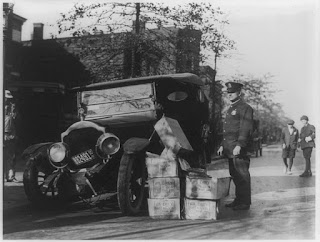La
Prohibición de consumir Alcohol en Estados Unidos
en la década de 1920, con la intención de cortar el exagerado consumo, puso a
la nación en un estado de cuasi guerra,
con pérdidas y ganancias que todavía se debaten.
Más abajo encontramos vocabulario en algunos párrafos (en inglés): bootleggers, speakeasies,
y rum-runners.
Y pusimos fotos históricas de contrabandistas y speakeasies. ¡No te lo pierdas!
… the era changed the way many Americans view
alcoholic beverages, enhancing the realization that federal government control
cannot always take the place of personal responsibility.
Sobre la Prohibición
La Prohibición
de alcohol en la década del ´20 y del ´30 en los Estados Unidos tuvo la intención de reducir el consumo de alcohol, eliminando los negocios de
fabricación, distribución y venta.
Resultó en la realización de que el control federal gubernamental no puede
reemplazar la responsabilidad personal.
El
alcoholismo del siglo 19 llevó a prohibir el tráfico de alcohol.
Muchas comunidades prohibieron la venta de alcohol.
La posesión privada y el consumo de alcohol no se
hicieron ilegales a nivel federal pero muchos estados implementaron leyes muy
estrictas.
Muchas bandas tomaron el control del negocio de las
bebidas, ejerciendo una violencia nunca antes vista.
Aunque la Prohibición falló si hizo visible un problema que afectaba a la sociedad y tuvo el efecto de bajar el consumo de la población.
Paragraphs
The prohibition
of alcohol in the 1920's and 30's in the
United States is one of most famous, or infamous, times in recent American history. The intention was to
reduce the consumption of alcohol by eliminating businesses that manufactured,
distributed and sold it. Considered by many as a failed social and political
experiment, the era changed the way many Americans
view alcoholic beverages, enhancing the realization that federal government control cannot always take the place of personal
responsibility. We associate the era with gangsters, bootleggers,
speakeasies, rum-runners
and an overall chaotic situation in respect to the social network of Americans.
During the 19th century, alcoholism, family violence, and saloon-based political corruption prompted activists, led by pietistic
Protestants, to end the alcoholic
beverage trade to cure the ill society and weaken the political opposition.
One result was that many communities in the late 19th and early 20th centuries introduced alcohol prohibition, with the
subsequent enforcement in law becoming a hotly debated issue. Prohibition
supporters, called drys, presented it as a victory for public morals and
health.
It
gained a national grass roots base through the Woman's Christian Temperance
Union. After 1900 it was coordinated by the Anti-Saloon
League. Opposition from the beer industry mobilized "wet" supporters
from the Catholic and German Lutheran communities. They had funding to fight
back but by 1917-18 the German community had been marginalized by the nation's
war against Germany, and the brewing industry was shut down in state after
state by the legislatures and finally nationwide under the Eighteenth Amendment
to the United States Constitution in 1920. Private
ownership and consumption of alcohol were not made illegal under federal law,
but local laws were stricter in many areas, with some states banning
possession outright.
In the 1920s the laws were widely disregarded, and tax revenues were lost. Very well organized criminal gangs took control of the beer and liquor supply for many cities, unleashing a crime wave that shocked the nation. By the late 1920s a new opposition mobilized nationwide. Wets attacked prohibition as causing crime, lowering local revenues, and imposing rural Protestant religious values on urban America. Prohibition ended with the ratification of the Twenty-first Amendment, which repealed the Eighteenth Amendment on December 5, 1933. Some states continued statewide prohibition, marking one of the last stages of the Progressive Era.
Although popular opinion believes that Prohibition failed, it succeeded in cutting overall alcohol consumption in half during the 1920s, and consumption remained below pre-Prohibition levels until the 1940s, suggesting that Prohibition did socialize a significant proportion of the population in temperate habits, at least temporarily.

Antes de la Prohibición los bares eran para hombres, Raceland, Lousiana
Vocabulario
Bootlegger:
a person who makes or sells alcoholic liquor illegally.
… in sleepy little St-Hilaire, once a Prohibition
boom town, from which bootleggers smuggled
truckloads of whisky.
Speakeasy: a place where alcoholic
beverages are illegally sold.
Specifically: such a place during the period of
prohibition in the U.S.
Rum runners: Rum-running, or bootlegging, is the illegal business of smuggling alcoholic beverages where such transportation is forbidden by law. The term rum-running is more commonly applied to smuggling over water; bootlegging is applied to smuggling over land.

Clientes esperando la apertura de un speakeasy, 1.921
De la web
Organized
crime in Los Angeles in 1930s
National organized crime penetrates L.A. in the
1930s through Bugsy Siegel and others.
Police corruption leads to recall of corrupt Mayor Frank Shaw. Earl Warren as State Attorney General closes
down offshore gambling in Santa Monica Bay.
Artículos relacionados
Se revela que Mayella se le había insinuado a Tom,
con el resultado de ser golpeada por su papá. El jurado… To
Kill a Mockingbird
… lo vuelven a admitir en su círculo de conformidad,
sin embargo Babbitt nunca pierde su esperanza de encontrar un verdadero sentido
a… Babbitt
Contribuyó a la causa de la independencia aportando
dineros y hacienda y… Juana
Manuela
Fuentes
Prohibition
in the United States, Wikipedia
Si visitas Salta puedes alojarte en un departamento completamente amoblado,
apto para 3 personas, y que alquilamos a
los seguidores del blog con un descuento especial. Deja tu mail que te
enviaremos más información. “The apartment is very nice and super comfortable…”
(booking.com)

No hay comentarios:
Publicar un comentario
Deja aquí tus mensajes, comentarios o críticas. Serán bienvenidos